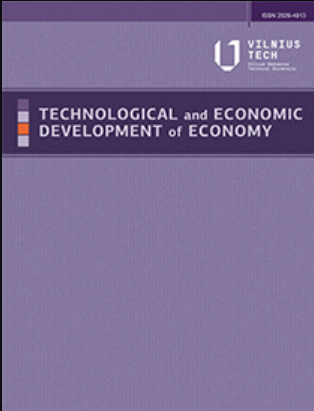外商直接投资逆向技术溢出对中国绿色创新的影响机制
IF 3.9
2区 经济学
Q1 ECONOMICS
引用次数: 3
摘要
随着全球经济的快速发展,对外直接投资(FDI)已经成为一个有争议的问题,主要集中在它是否有助于国内,特别是发展中国家的绿色创新。对外直接投资如何逆转技术外溢到中国,中国的先天禀赋是否限制了它?相关机制尚不清楚。因此,本研究考察了吸收能力对中国对外直接投资逆向技术溢出对绿色创新影响路径的异质性效应。利用固定效应面板模型和逐步回归分析了对外直接投资与绿色创新之间的直接关系以及吸收能力的中介关系。阈值分析揭示了中国31个省份吸收能力中介效应的突变点。对外直接投资的反向技术溢出效应更为显著,直接刺激了国内绿色创新。吸收能力作为中介变量具有间接影响。中介效应只在阈值一侧有意义,因为只有更大的吸收能力(包括充足的绿色金融支持、更突出的人力资本和更小的技术差距)才能提高绿色创新的转型有效性。此外,中国的区域异质性显著。本文章由计算机程序翻译,如有差异,请以英文原文为准。
THE INFLUENCE MECHANISM OF OUTWARD FDI REVERSE TECHNOLOGY SPILLOVERS ON CHINA’S GREEN INNOVATION
With rapid global development, outward foreign direct investment (FDI) has become a controversial issue, mainly focused on whether it is helpful to domestic green innovation, especially in developing countries. How does outward FDI reverse spillover technology to China, and does China’s innate endowment restrict it? The relevant mechanisms remain unclear. Therefore, this study investigated the heterogeneous effect of absorptive capacity on the impact path of reverse technology spillovers of outward FDI on green innovation in China. A fixed-effects panel model and stepwise regression analyze the direct relationship between outward FDI and green innovation and the mediating relationship of absorptive capacity. Threshold analysis reveals the mutation point of the mediating effect of absorptive capacity among China’s 31 provinces. Domestic green innovation is directly stimulated by more significant reverse technology spillovers of outward FDI. Absorptive capacity has an indirect impact as an intervening variable. The mediating effect will only make sense on one side of the threshold because the transformation effectiveness of green innovation is improved only by greater absorptive capacity, including adequate green financial support, more outstanding human capital, and a smaller technology gap. Moreover, it revealed significant regional heterogeneity in China.
求助全文
通过发布文献求助,成功后即可免费获取论文全文。
去求助
来源期刊
CiteScore
10.00
自引率
8.50%
发文量
66
审稿时长
15 weeks
期刊介绍:
Technological and Economic Development of Economy is a refereed journal that publishes original research and review articles and book reviews. The Journal is designed for publishing articles in the following fields of research:
systems for sustainable development,
policy on sustainable development,
legislation on sustainable development,
strategies, approaches and methods for sustainable development,
visions and scenarios for the future,
education for sustainable development,
institutional change and sustainable development,
health care and sustainable development,
alternative economic paradigms for sustainable development,
partnership in the field of sustainable development,
industry and sustainable development,
sustainable development challenges to business and management,
technological changes and sustainable development,
social aspects of sustainability,
economic dimensions of sustainability,
political dimensions of sustainability,
innovations,
life cycle design and assessment,
ethics and sustainability,
sustainable design and material selection,
assessment of environmental impact,
ecology and sustainability,
application case studies,
best practices,
decision making theory,
models of operations research,
theory and practice of operations research,
statistics,
optimization,
simulation.
All papers to be published in Technological and Economic Development of Economy are peer reviewed by two appointed experts. The Journal is published quarterly, in March, June, September and December.

 求助内容:
求助内容: 应助结果提醒方式:
应助结果提醒方式:


